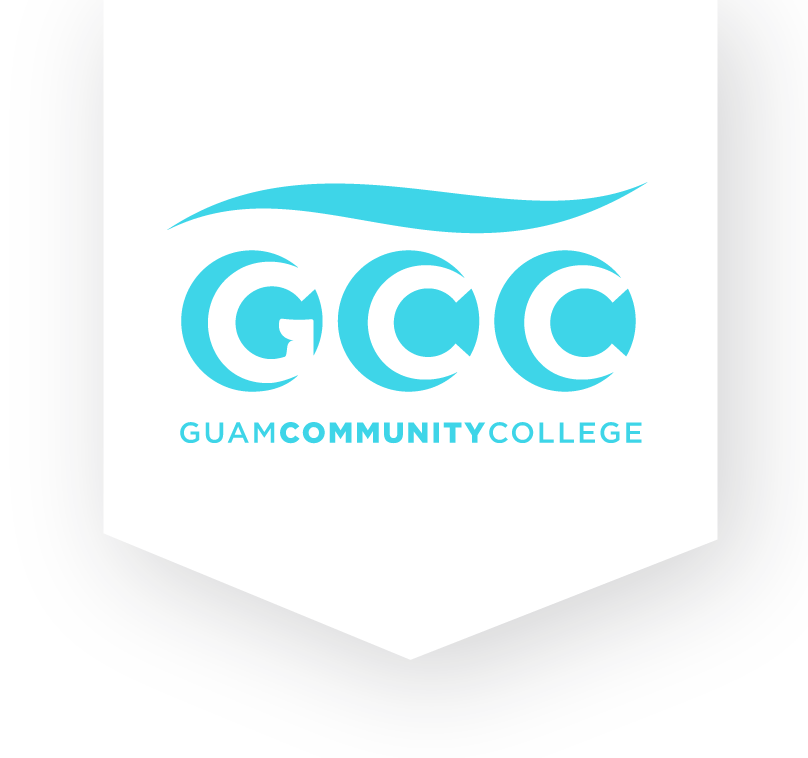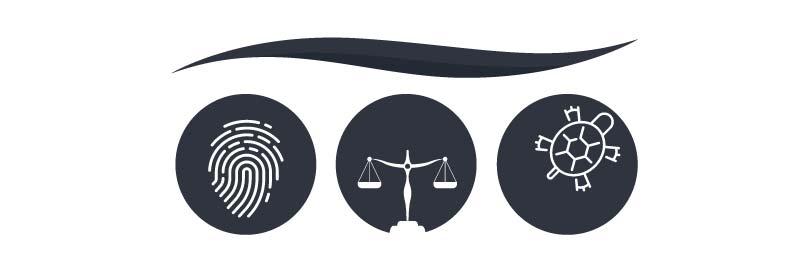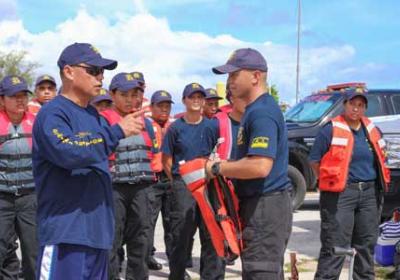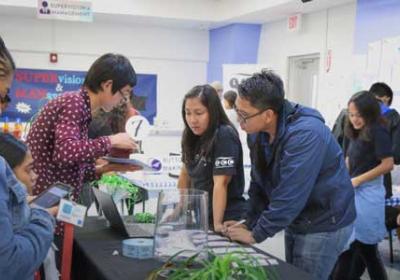Associate of Science in Criminal Justice with Administration Concentration
- You are on...
Main Page for Criminal Justice A.S. with Administration Concentration
Associate of Science in Criminal Justice with Administration Concentration
Total Credit Hours: 61-62
This program is designed to address training requirements for students seeking employment as police officers, marshals, conservation officers, Guam Customs officers, investigators, corrections officers, forensic computer examiners, forensic lab technicians, and other public safety employees. Students may choose an emphasis in one of four areas of concentration:
- Administration of Criminal Justice
- Law Enforcement Administration
- Forensic Lab Technician
- Forensic Computer Examiner
Some courses in this program must be sequenced because of prerequisite requirements. Other courses, including mathematics and English, require placement testing before enrollment is granted (see a Criminal Justice advisor before enrolling in this program or choosing electives).
| Administration of Criminal Justice Track | ||
| General Education Requirements | ||
| Course | Course Name | Credits |
| English (Choose 1) | ||
| EN110 | Freshman Composition | 3 |
| EN110A | Freshman Composition with Instructional Lab | 4 |
| Natural & PhysicalScience Requirement (Choose 1) | ||
| SI 103/103L | Introduction to Marine Biology: Theory (3) & Introduction to Marine Biology Laboratory (1) | 4 |
| SI 110/110L | Environmental Biology: Theory (3) & Environmental Biology Laboratory (1) | |
| Course | Course Name | Credits |
| MA110A | Finite Mathematics | 3 |
| CS151 | Windows Applications | 3 |
| HU120 | Pacific Cultures | 3 |
| PS140 | American Government | 3 |
| Major Requirements | ||
| Course | Course Name | Credits |
| PY125 | Interpersonal Relations | 3 |
| SO130 | Introduction to Sociology | 3 |
| CJ100 | Introduction to Criminal Justice | 3 |
| CJ150 | Criminal Procedure | 3 |
| CJ200 | Criminal Law | 3 |
| CJ206 | Social Values & the Criminal Justice Process | 3 |
| CJ292 | Criminal Justice Practicum | 3 |
| CJ101 | Juvenile Justice Process | 3 |
| CJ107 | Introduction to Corrections | 3 |
| CJ204 | Introduction to Criminology | 3 |
| CJ209 | Concept of Police Operations | 3 |
| ELECTIVES | ||
| ANY CJ COURSE | 3 | |
| ANY CJ COURSE | 3 | |
| ANY CJ COURSE | 3 | |
| PROGRAM TOTAL | 61-62 | |
2024-2025 College Catalog
Recognizing the necessity for students to succeed in the complex and rapidly changing workplace, Guam Community College offers a general education curriculum that introduces students to major areas of knowledge and methods of inquiry. All degree programs require an interdisciplinary general education component that promotes the development of intellectual skills that enable students to become effective learners and informed citizens. Critical thinking, the use of language and computation, appropriate social skills, global awareness and respect for diverse opinions are among the learning outcomes provided in the general education requirements of each program.
Guam Community College believes that general education provides the academic foundation necessary for students to achieve their life goals. General education is intended to offer students a breadth of quality student learning experiences, encourage their respect for cultural heritage, promote their ethical and responsible social behavior and facilitate their life-long learning.
The General Education program strives to foster student learning and skill development in civic engagement, critical thinking, understanding of the relationship between the individual and society, information literacy, oral communication, quantitative reasoning, and written communication.
Guam Community College believes that high quality general education opportunities for all citizens are necessary for democratic principles and practices to exist and for a sound economy to flourish. The College continually scrutinizes the general education curriculum in order to assure that all degrees and certificates granted by the College support this vision of general education and that it serves as a means to inspire hope, opportunity and responsibility in all its constituencies.
Requirements for General Education follow the options described below. Students declared prior to fall 2010 will follow the requirements indicated in the applicable catalog in which they first declared their major program at the College.
Notes on General Education requirements
Students are advised to check the requirements for their specific programs before taking General Education courses.
Courses chosen to meet the general education requirements may not be used to meet the Major Requirements of a student’s specific degree program.
The list contains courses with pre-requisites, so students should make their choices carefully and thoughtfully. Students may consult a counselor or an academic advisor for guidance in choosing any of the course options listed.
IMPORTANT NOTE: Some programs require different levels of coursework to meet General Education requirements, please review the individual programs for more information.
| GENERAL EDUCATION | ||
| Scope 1: Skills for and Application of Lifelong Learning | ||
| Freshman Composition (Choose one course from the following to meet the required 3-4 credits) | ||
| Course # | Course Name | Credits |
| EN 110 | Freshman Composition | 3 |
| EN110A | Freshman Composition with Instructional Lab | 4 |
| EN 111 | Writing for Research | 3 |
| Mathematics (Choose one course from the following to meet the required 3-4 credits)* | ||
| Course # | Course Name | Credits |
| MA 110A | Finite Mathematics | 3 |
| MA 115 | Fundamentals of College Algebra | 3 |
| MA 161A | College Algebra & Trigonometry I | 3 |
| *Any college level math will be considered for the completion of this category | ||
| Literacy for Life Skills (Choose one course from the following to meet the required 3 credits) | ||
| Course # | Course Name | Credits |
| CO 110 | Critical Thinking for Civic Engagement | 3 |
| CS 151 | Windows Applications | |
| CS 152 | Macintosh Applications | |
| Scope 2: Broad Comprehension of the Development of Knowledge, Practice and Interpretation | ||
| Humanities & Fine Arts (Choose one course from the following to meet the required 3-4 credits)* | ||
| Course # | Course Name | Credits |
| ASL 100 | American Sign Language I | 4 |
| CH 110 | Chamorro I | 4 |
| ED 265 | Culture & Education in Guam | 3 |
| CO 125 | Introduction to Human Communication and Speech | 3 |
| EN 210 | Introduction to Literature | 3 |
| HI 121 | World Civilization (Pre-historic Time to 1500) | 3 |
| HI 122 | World Civilization (1500 to Present Time) | 3 |
| HI 176 | Guam History | 3 |
| HM 110 | Introduction to Community Services | 3 |
| HM 201 | Social Welfare & Development | 3 |
| HU 120 | Pacific Cultures | 3 |
| HU 220 | Guam Cultures & Legends | 3 |
| JA 110 | Japanese I | 4 |
| KE 110 | Korean I | 4 |
| PI 101 | Introduction to Philosophy | 3 |
| TH 101 | Introduction to the Theater | 3 |
| VC 101 | Introduction to Visual Communications | 3 |
| *Any foreign language, humanities, or fine arts course will be considered for the completion of this category | ||
| Natural & Physical Sciences (Choose one course and the corresponding lab from the following to meet the required 4 credits)** | ||
| Course # | Course Name | Credits |
| SI 101/101L | Introduction to Chemistry: Theory (3) & Introduction to Chemistry Laboratory (1) | 4 |
| SI 103/103L | Introduction to Marine Biology:Theory (3) & Introduction to Marine Biology Laboratory (1) | |
| SI 105/105L | Introduction to Physical Geology (3) & Introduction to Physical Geology Laboratory (1) | |
| SI 110/110L | Environmental Biology:Theory (3) & Environmental Biology Laboratory (1) | |
| SI 141 | Applied Physics I | |
| SI 150/150L | Introduction to Microbiology: Theory (3) & Introduction to Microbiology Laboratory (1) | |
| SI131/131L | Human Anatomy & Physiology I: Theory (3) & Human Anatomy & Physiology I Laboratory (1) | |
| SI132/132L | Human Anatomy & Physiology II: Theory (3) & Human Anatomy & Physiology II Laboratory (1) | |
| **The exception to this would be SI141 which does not include a laboratory requirement | ||
| Scope 3: Preparation for and Acceptance of Responsible Participation in Civil Society | ||
| Social & Behavioral Sciences (Choose one course from the following to meet the required 3 credits) | ||
| Course # | Course Name | Credits |
| EC 110 | Principles of Economics | 3 |
| PS140 | American Government | 3 |
| PY 100 | Personal Adjustment | 3 |
| PY 120 | General Psychology | 3 |
| PY 125 | Interpersonal Relations | 3 |
| SO 130 | Introduction to Sociology | 3 |
| CJ 100 | Introduction to Criminal Justice | 3 |
| WG 101 | Introduction to Women and Gender Studies | 3 |
| *Any social and behavioral science course will be considered for the completion of this category | ||
| Minimum General Education Requirements | 19 | |
2024-2025 College Catalog
| Administration of Criminal Justice Track | |||||
| Year 1 | |||||
| Semester 1 | Semester 2 | ||||
| Course | Course Name | Credits | Course | Course Name | Credits |
| CJ100 | Introduction to Criminal Justice | 3 | CJ101 | Juvenile Justice Process | 3 |
| CJ107 | Introduction to Corrections | 3 | CJ150 | Criminal Procedure | 3 |
| EN110 | Freshman Composition | 3 | CJ200 | Criminal Law | 3 |
| MA110A | Finite Mathematics | 3 | PS140 | American Government | 3 |
| PY125 | Interpersonal Relations | 3 | SO130 | Introduction to Sociology | 3 |
| Total | 15 | Total | 15 | ||
| Year 2 | |||||
| Semester 3 | Semester 4 | ||||
| Course | Course Name | Credits | Course | Course Name | Credits |
| CJ 204 | Introduction to Criminology | 3 | CJ292 | Criminal Justice Practicum | 3 |
| CJ206 | Social Values & the Criminal Justice | 3 | Related Major Course | 3 | |
| CJ 209 | Concept of Police Operations | 3 | Related Major Course | 3 | |
| CS151 | Windows Applications | 3 | Related Major Course | 3 | |
| SI___ | Natural & Physical Sciences Requirement | 4 | HU120 | Pacific Cultures | 3 |
| Total | 16 | Total | 15 | ||
| Program Total | 61 | ||||
2024-2025 College Catalog
- Identify the legal procedures for gathering information about crimes, criminal procedure, and defendants’ rights.
- Describe the process of the criminal justice system including the duties and responsibilities of the criminal justice professional as it pertains to one of the chosen concentration areas: Administration of Criminal Justice, Law Enforcement Administration, Forensic Lab Technician, or Forensic Computer Examiner.
- Demonstrate the ability to understand the interrelations, ethics, and role expectations of the criminal justice professional in society.



















